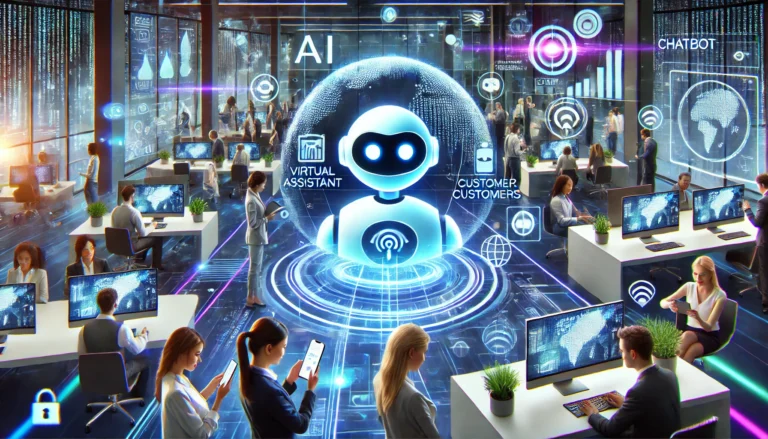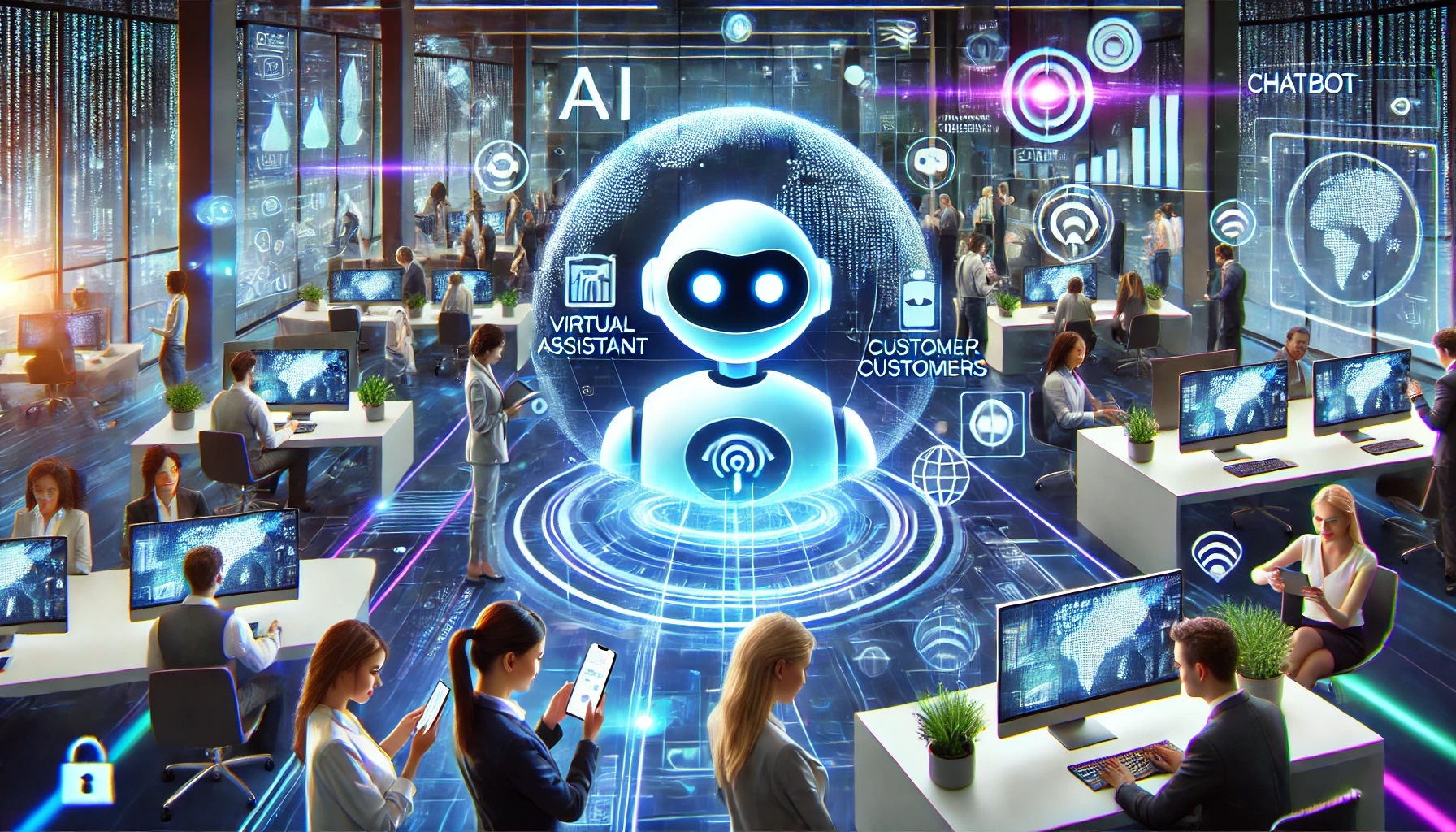Introduction
In today’s fast-paced and highly competitive digital era, businesses are constantly seeking innovative ways to enhance customer service efficiency. One of the most revolutionary tools in this space is AI chatbots. These cutting-edge systems leverage small language models powered by artificial intelligence to optimize customer interactions, improve response times, and provide personalized support. As businesses strive to meet increasing customer expectations, AI chatbots have emerged as an indispensable asset for delivering seamless and cost-effective service.
AI chatbots are no longer just optional tools; they are now a critical component of modern customer service strategies. By integrating small language models into these systems, businesses can revolutionize their operations and deliver exceptional customer experiences. This article explores how AI chatbots powered by small language models can significantly enhance customer service by improving response times, personalizing interactions, and offering cost-effective solutions.
Improved Response Times: The Power of AI Chatbots
Instantaneous Query Handling
One of the key advantages of AI chatbots is their ability to process customer queries in real time. Unlike traditional systems that rely on human agents, AI chatbots use small language models to understand and analyze customer inquiries instantly. These systems can handle everything from basic questions, such as store hours or product availability, to more complex issues that require nuanced understanding.
For instance, a customer visiting an online retail site can use an AI chatbot to track their order or inquire about return policies. The AI chatbot responds instantly, ensuring that the customer’s needs are met without delay. This capability not only enhances customer satisfaction but also reduces the workload on human agents, allowing them to focus on more complex tasks.

24/7 Availability
Another significant advantage of AI chatbots is their ability to provide round-the-clock service. In a global market where customers may reach out from different time zones, 24/7 availability is crucial. Unlike human agents who need breaks and operate within set schedules, AI chatbots can function continuously, ensuring that no query goes unanswered, regardless of the time.
This feature is especially beneficial for businesses in industries like e-commerce or travel, where customers often need immediate assistance outside of regular working hours. The presence of an AI chatbot guarantees that customers can resolve issues at any time, enhancing the overall customer experience and building trust in the brand.
Reduced Wait Times
Long wait times are a common frustration for customers seeking support. Traditional customer service models often struggle to manage high volumes of inquiries during peak times. AI chatbots, however, excel at handling multiple conversations simultaneously, ensuring that customers receive timely assistance without waiting in queues.
For example, during a holiday sale or a product launch, businesses might experience a surge in customer queries. An AI chatbot can manage this influx efficiently, providing quick responses to routine questions and freeing human agents to handle more intricate or sensitive issues. By reducing wait times, AI chatbots improve satisfaction and foster positive relationships with customers.
Personalized Customer Interactions: Elevating the Customer Experience
Understanding Customer Preferences
Modern customers expect interactions that go beyond generic responses. AI chatbots powered by small language models can analyze past interactions and customer data to understand preferences and provide personalized support. This capability allows businesses to create more meaningful and engaging experiences.
For instance, an AI chatbot for a fitness brand might recognize a customer’s interest in workout equipment and proactively offer information about new products, discounts, or related accessories. This level of personalization makes customers feel valued and understood, encouraging loyalty and repeat business.
Tailored Product Recommendations
In addition to answering questions, AI chatbots can act as virtual shopping assistants by offering personalized product recommendations. By analyzing a customer’s browsing history, purchase behavior, and preferences, an AI chatbot can suggest items that align with their interests.
For example, an AI chatbot on an e-commerce platform might recommend complementary items to a customer purchasing a smartphone, such as screen protectors or phone cases. These tailored suggestions not only enhance the shopping experience but also increase the likelihood of additional sales.
Consistency in Brand Voice
Maintaining a consistent tone and voice across all communication channels is critical for building trust and a strong brand identity. AI chatbots ensure this consistency by adhering to predefined tone and style guidelines. Whether a customer interacts through live chat, email, or social media, the AI chatbot delivers responses that align with the brand’s personality.
For example, a friendly and casual brand can program its AI chatbot to use a conversational tone, while a professional service provider might opt for more formal language. This uniformity in communication reinforces brand reliability and enhances customer trust.
Cost-Effective Solutions: Balancing Quality and Budget with AI Chatbots
Lower Operational Costs
Integrating AI chatbots into customer service operations is an effective way to reduce costs. By automating routine inquiries, businesses can minimize their reliance on large support teams, leading to significant savings on labor and operational expenses. AI chatbots handle repetitive tasks, such as answering FAQs, without the need for human intervention.
For example, a company that previously employed dozens of agents for handling basic inquiries can now redirect those resources to more critical areas, such as product development or strategic planning. This streamlined approach ensures that businesses maintain high-quality service while reducing overhead costs.
Minimizing Training Time
Training new customer service staff is often time-consuming and resource-intensive. With AI chatbots managing routine queries, businesses can significantly reduce the amount of training required for human agents. New hires can focus on learning how to handle complex or sensitive issues, while the AI chatbot takes care of simpler tasks.
For instance, an AI chatbot in a retail setting can handle questions about store policies, leaving human agents free to assist customers with personalized recommendations or conflict resolution. This division of labor not only accelerates onboarding but also enhances the efficiency of the customer service team.
Scalability for Growing Businesses
As businesses grow, so do their customer service needs. Scaling a traditional customer support team often requires substantial investment in hiring and training new staff. In contrast, AI chatbots offer a scalable solution that can handle increased volumes of inquiries without additional costs.
For startups and small businesses, AI chatbots are particularly valuable. They provide a cost-effective way to maintain high service standards during periods of growth or peak activity, such as product launches or seasonal sales. By efficiently managing fluctuating workloads, AI chatbots ensure that businesses remain agile and responsive to customer demands.
Conclusion: AI Chatbots as a Game-Changer for Customer Service
The rise of AI chatbots has transformed the customer service landscape, offering businesses a powerful tool to enhance efficiency, personalization, and cost-effectiveness. By leveraging small language models, AI chatbots can provide instant, 24/7 support, understand customer preferences, and deliver consistent, brand-aligned responses. These capabilities not only improve the customer experience but also streamline operations and reduce costs for businesses.
From reducing wait times and offering personalized recommendations to ensuring scalability, AI chatbots have become an essential component of modern customer service strategies. As customer expectations continue to rise, businesses that embrace AI chatbots will be better equipped to meet these demands and remain competitive in an increasingly digital world.
By integrating AI chatbots into their operations, companies can foster stronger customer relationships, enhance satisfaction, and drive long-term success. In an era where exceptional customer service is a key differentiator, AI chatbots offer a winning solution for businesses of all sizes.
FAQs
-
What are AI chatbots?
AI chatbots are automated systems powered by artificial intelligence that interact with customers to handle queries, provide information, and assist with tasks. -
How do AI chatbots improve response times?
AI chatbots use small language models to process inquiries in real time, delivering instant responses and significantly reducing wait times. -
Can AI chatbots personalize customer interactions?
Yes, AI chatbots analyze customer data to understand preferences and provide tailored responses and recommendations. -
Do AI chatbots operate 24/7?
Absolutely. AI chatbots are available around the clock, ensuring continuous support for customers in any time zone. -
How do AI chatbots reduce operational costs?
By automating routine tasks, AI chatbots minimize the need for extensive staffing, leading to significant cost savings. -
Are AI chatbots scalable for growing businesses?
Yes, AI chatbots can handle increased customer inquiries without additional costs, making them ideal for scaling operations. -
How do AI chatbots ensure brand consistency?
AI chatbots can be programmed to follow specific tone and style guidelines, maintaining uniform communication across all channels.



